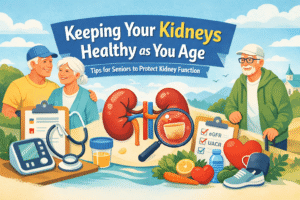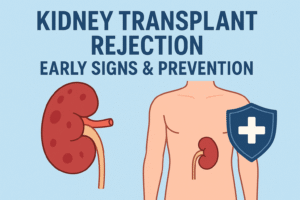Acute Kidney Injury (AKI) is defined as the sudden reduction in kidney function over the course of several hours to days. Unlike chronic kidney disease, AKI has the potential to resolve if appropriate measures are taken within a timely window. It poses significant health risks and requires immediate intervention to prevent irreversible harm.
At Southern Oklahoma Kidney Center, active surveillance and management of Acute Kidney Injury (AKI) is one of the primary focuses. This article outlines the most significant causes and treatments for AKI drawing from real patient experiences alongside internal documents from SouthernOKC.
Which Factors Lead To Acute Kidney Injury?
The acute deterioration of a person’s renal function leads to the inability of waste breakdown and extraction. The following factors are associated with reserved declines in renal function:
- Reduced perfusion due to low blood pressure or dehydration, heart failure, advanced age.
- Infection, inflammation or certain malignancies attack on renal parenchyma.
- Obstruction due to nephrolithiasis or prostatic enlargement
As highlighted on the dedicated Hypertension & Kidney Disease webpage, it is important to note that hypertension contributes not only as a causative factor of chronic kidney disease but also during an episode of unstable blood flow caused acutely increases vascular resistance.
Recognizing Warning Signs to Observe
Acute Kidney Injury (AKI) has diverse symptoms, but swelling in the legs, ankles, or around the eyes is common. Other symptoms include:
- Reduced Urine Excretion
- Dyspnea
- Feeling Tired or Confused
- Nausea or Pressure in the Chest
Because these symptoms may describe other illnesses, timely laboratory evaluations are crucial for confirming each diagnosis. The Kidney Disease & Anemia page explains how anemia often overlaps with kidney problems and may exacerbate symptoms such as fatigue.
Who Is Likely To Be Affected These Symptoms?
AKI may develop in anyone; however, the following groups stand at greater risk:
- Patients admitted to hospitals especially those in the intensive care unit.
- Elderly individuals.
- Individuals suffering from diabetes and heart diseases.
- Patients on kidney-damaging drugs, NSAIDs or some antibiotics.
At SouthernOKC, the clinicians closely observe high-risk patients and modify therapies aimed at minimizing the risk of developing AKI.
How Is Acute Kidney Injury Diagnosed?
The most common ways to diagnose AKI includes:
- Bloodwork (looking for creatinine and blood urea nitrogen elevations)
- Urinalysis (looking for abnormal constituents of urine and infection).
- Imaging studies like ultrasound to rule out some occult pathological conditions of blockage.
- These methods are part of routine care offered at Southern Oklahoma Kidney Center, enabling swift diagnosis and intervention.
Treatment Options:
The treatment of Acute Kidney Injury is multi-faceted, based on specific causes and intensity. Essential actions include:
- Restoration of fluid balance: Control of hydration can be achieved with diuretics or intravenous fluids.
- Management of blood pressure: Maintaining adequate perfusion is important.
- Protection from medication harm: Antibiotics or pain relief medications that may harm the kidneys are stopped.
- Treatment of infections or obstructive processes: Any infection or obstructive process responsible for causing AKI must be treated.
In extreme scenarios, it can become necessary to initiate dialysis temporarily. The section concerning ‘Diabetes & Kidney Disease’ explains how diabetes complicates kidney diseases, including AKI and may require more advanced care.
Recovery and Prevention
Many patients are likely to regain full kidney function if intervention is timely. However some patients may sustain functional impairment and progress to chronic kidney disease.
To reduce chances of sustaining Acute Kidney Injury:
- One should always maintain proper levels of hydration especially during sickness.
- Avoid excessive use of NSAIDs.
- Control coexisting diseases such as diabetes and hypertension.
- Notify your physician regarding any new medicines.
Acute Kidney Injury remains a significant concern but can often be addressed with expedient action. For high-risk individuals, tailored strategies from nephrology experts such as those at Southern OKC prove invaluable.
Contact Southern Oklahoma Kidney Center for a thorough evaluation and management if you or your loved one is exhibiting symptoms or dealing with associated health conditions.



